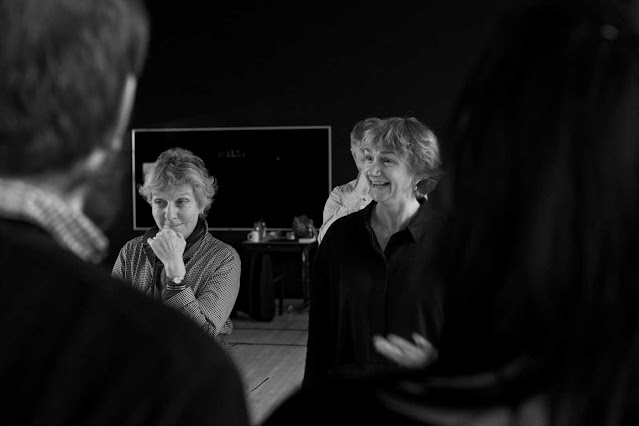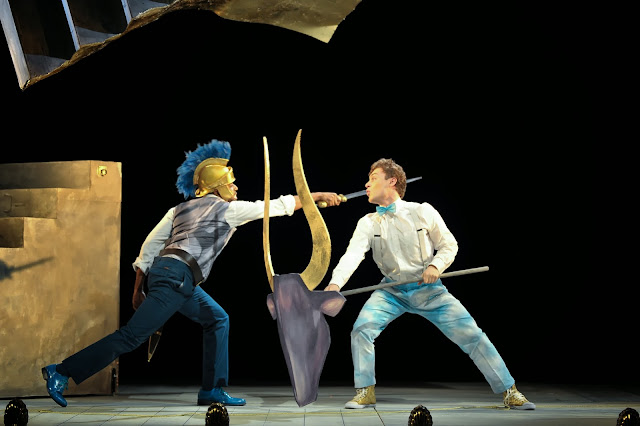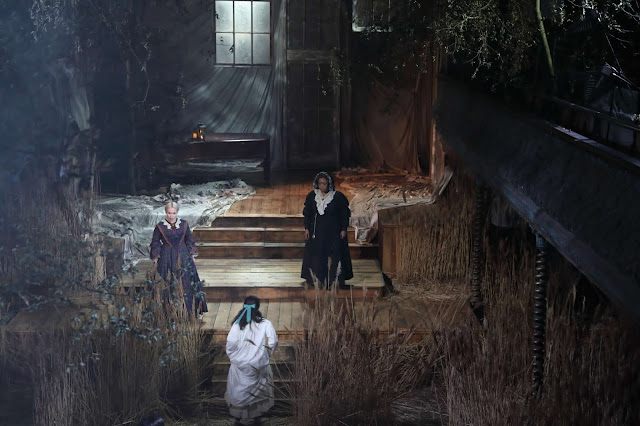 |
| Selina Cadell and Eliza Thompson (Photo Patrick Cadell) |
 |
| Britten: The Turn of the Screw - Robert Murray - OperaGlass Works on Marquee TV (Photo Laurie Sparham) |
Whilst we might refer to Stravinsky's The Rake's Progress, in fact, it was WH Auden and Chester Kalman's English libretto that originally drew Selina Cadell into the work. She admits that she hated opera for much of her life, and when she saw The Rake's Progress she found it incomprehensible. But the libretto, by one of the great 20th century poets, WH Auden, and his lover, Chester Kalman, intrigued her. She persuaded the National Theatre to let her do a workshop on the text and singing some excerpts was a young tenor, Robert Murray. This was the seed from which OperaGlass Works' production of The Rake's Progress in 2017 grew. It was very much if you have a dream you just have to do it.
As an actor, Selina Cadell had done a lot of Restoration and 18th-century drama, but also had a second string to her bow teach actors to act! Thanks to one of the attendees of a workshop she was put forward for a post teaching singers to act. She did not expect anything to come of it, till she was phoned by bass Richard Van Allan, who was director of the National Opera Studio (NOS) from 1968 to 2001. Almost her first words to him were 'I don't like opera' and his response was 'Good'. The upshot was that she went along to the NOS for a test visit. There she found young singers desperate to learn, and she found herself able to teach them to believe in what they were singing. She stayed, for 25 years. Selina comments that her life has changed because of opera.
Eliza is a dramaturg, a role which in England tends to rather confuse people which I think she enjoys. Her background is in music and theatre, and opera is a natural combination of the two. She comments that if you can get opera to work, you have cracked it but too often the performance fails to connect with the storytelling.
 |
| Handel: Arianna in Creta - Tai Oney, Elliott Ross - London Handel Festival 2014 (Photo Chris Christodoulou) |
Selina directed opera scenes for NOS and then someone at the London Handel Festival put together Selina's experience in Resetoration and 18th-century English drama and her work at the NOS and suggested she direct an opera for the festival. This was Handel's Arianna in Creta at the Royal College of Music in 2014 [see my review] For Selina it was no great leap; 17th and 18th century English drama is not naturalistic, it is a similar heightened art form. She found opera seria to be immensely enjoyable, rather than being constrained by the style. She loves the standard ABA form of the Da Capo arias and feels it is important that you admit that you are singing and with the Da Capo, the singer returns to the opening material and sings it better.
For Arianna in Creta, Selina was directing and Eliza assisting; for some reason, they started a conversation about The Rake's Progress, how Selina would love to put it on. It felt a natural progression from opera seria to neo-classical 20th-century opera, and of course those fabulous words. It turns out that Lawrence Cummings, music director of the London Handel Festival, had a similar interest in the opera (The Rake's Progress has a significant harpsichord part). Thus OperaGlass Works was born. But it was also influenced by conversations about what opera should be, how it could be different.
Both Selina and Eliza are passionate about making opera affordable, whilst not wanting to compromise. So OperaGlass Works works with major artists and uses full orchestrations no reductions for two or three instruments. This means that the company is based on significant fundraising, but both Selina and Eliza admit that people have been generous.
 |
| Stravinsky: The Rake's Progress - Laurence Cummings - Opera Glass Works 2017 (Photo Catherine Ashmore) |
This enabled the company to return, and after The Rake's Progress there was the question, 'What next?'. Having staged The Rake's Progress at Wilton's, they wanted to come back which meant a chamber piece. The Turn of the Screw seemed an obvious fit, and working on it they have found many parallels between the two operas. But they looked elsewhere too, it didn't have to be 20th-century, it didn't have to be English; both Selina and Eliza seem intrigued at the idea of doing an Italian piece and ensuring the singers are as direct with the language as in English.
It was essential they find a piece that was viable for them, and Britten's opera is scored for just 13 instruments. Selina calls the scoring magical. The libretto is perfect; Selina describes it as pure and clear. And both feel the opera plays to OperaGlass Works' strengths. As a company, it is dedicated to giving singers the chance to work as actors do, integrating acting and singing, the music and the text indivisible. They want to be able to give singers and musicians the opportunity to work differently. Their aim is to bring the opera out of the opera house, but not have the restrictions of pub theatre. Eliza comments that they aim for the best, for the least cost!
The conductor for The Turn of the Screw is John Wilson, who similarly liked the idea of working collaboratively and who was to be present for all the rehearsals. Both Selina and Eliza admit that they have been fortunate in attracting major artists who want to work collaboratively with them. Inevitably money was tight, but people were generous and both Selina and Eliza find it a huge reward, being able to do what they love.
 |
| Britten: The Turn of the Screw - Rhian Lois, Alice Mererid Roberts, Gweneth Ann Rand - OperaGlass Works on Marquee TV (Photo Laurie Sparham) |
Both Selina and Eliza are good at 'never saying never', and happy to break a few rules. When we spoke last year this comment referred to ideas such as being able to get 19 people onto the stage at Wilton's (the orchestra was to be on stage with the singers), but 'never say never' can apply just as much to their determination to create The Turn of the Screw despite all that 2020 threw at them.
Benjamin Britten: The Turn of the Screw
Directed by Dominic Best, Selina Cadell and Eliza Thompson
Sets: Tom Piper
Costumes: Rosalind Ebbut
Prologue and Peter Quint: Robert Murray
Governess: Rhian Lois
Miles: Leo Jemison
Flora: Alys Mererid Roberts
Miss Jessel: Francesca Chiejina
Mrs Grose: Gweneth Ann Rand
Sinfonia of London
Conductor: JohnWilson
Available from Marquee TV
The blog is free, but I'd be delighted if you were to show your appreciation by buying me a coffee.
- Margaret Catchpole: Two Worlds Apart - Stephen Dodgson's final opera on disc at last and revealed as a work full of character and richly emotive music - CD review
- The Russian from Hampstead: Sofia Fomina & Alexander Karpeyev explore Nikolai Medtner's complex & passionate songs - Cd review
- Ancient and modern: two engaging new dance-based suites alongside Baroque music on the debut recording from a new American orchestra - CD review
- Conjuring the image of Felix and Fanny at the piano: Mendelssohn's own piano-duet transcriptions of A Midsummer Night's Dream and The Fair Melusine - CD review
- Reviving early English opera, staging Baroque opera: I chat to conductor Julian Perkins about his recording of John Eccles' Semele and staging Handel's Tamerlano - interview
- After Purcell and before Handel: a delightful new recording of John Eccles' Semele from the Academy of Ancient Music does full justice to this unjustly neglected work - CD review
- Allow yourself to float: Orchestra of the Swan's mix-tape compilation, Timelapse - CD review
- Latvian soprano Inga Kalna's debut disc, Der Rosenband, intriguingly combines songs by Richard Strauss with his Latvian contemporaries Jānis Mediņš and Alfrēds Kalniņš - CD review
- K: Brazilian conductor Simone Menezes and her new ensemble in Borodin, Debussy, Copland, Villa-Lobos and Lacaze - CD review
- Rinaldo and Armida: from Monteverdi to Rossini to Dvorak to Judith Weir, composers have been inspired by Torquato Tasso's Gerusalemme liberata - feature
- Obsessed with the symphonic form:
composer David Matthews on the symphony and the recent recording of his
eighth on Signum Classics with Jac van Steen and the BBC Philharmonic -
my interview
- Chemin des Dames: premiere
recording of New Zealand composer Gareth Farr's cello concerto, written
in memory of his great-uncles killed in the First World War - CD review
- Home

.jpg)









No comments:
Post a Comment